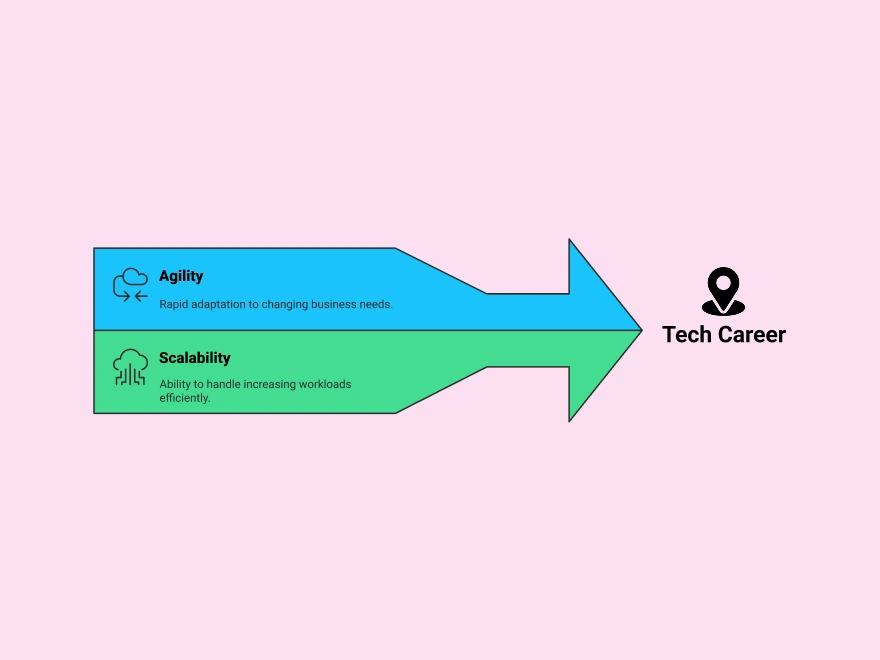“Cloud Computing is the digital wonderland of Internet of Things, powered by Artificial Intelligence and Big Data.”
Imagine you own a bakery. Business is booming, especially for your best-selling red velvet cupcakes. You suddenly notice a surge in customer demand, and now you need more hands on deck to keep up. So, you quickly hire a few extra bakers to ensure every customer gets their cupcake without waiting.
That’s scalability in action.
Now, let’s say you’ve got a brilliant idea for a new cupcake flavor—maybe mango caramel chocolate! But you’re unsure how people will respond, and investing a lot of money upfront could be risky. Instead, you decide to test it out using your existing team and ingredients. If the flavor takes off, then you invest more and scale up production.
That’s agility.
This is exactly how modern businesses and startups use cloud computing—whether they’re baking cupcakes or building cutting-edge tech products.
What Is Cloud Computing?
Cloud computing is the on-demand delivery of IT services—like storage, databases, software, and processing power—over the internet. Instead of buying physical servers or heavy infrastructure, companies use cloud platforms like AWS, Microsoft Azure, or Google Cloud.
This allows businesses to scale quickly and stay agile, depending on what their situation demands.
Scalability in Cloud Computing
Scalability refers to the ability of a system to handle increased workload without compromising performance.
Let’s relate it back to our bakery:
- A cloud system can add more “workers” (virtual machines or containers) as traffic increases.
- For example, during festive seasons or a product launch, cloud platforms automatically scale your resources to meet higher user demand.
Types of Scalability:
- Vertical Scalability: Upgrading existing resources (e.g., increasing RAM or CPU on a server).
- Horizontal Scalability: Adding more instances (like more ovens in the bakery) to distribute the load.
Agility in Cloud Computing
Agility is the ability to quickly adapt to changes or try new ideas with minimal risk.
Using cloud services:
- You can launch new features, test prototypes, or roll out applications faster than ever before.
- It promotes a fail-fast, learn-faster model—if something doesn’t work, you can pivot without wasting major resources.
Going back to our bakery example: trying out that new cupcake flavor without committing to a large investment? That’s cloud agility—testing with minimal risk.
Real-World Use Cases
- Netflix
Netflix scales its infrastructure globally to serve millions of users simultaneously, especially during prime time. They also experiment with new features (like interactive storytelling) using cloud agility. - Zomato/Swiggy
During peak hours or promotions, these food delivery apps automatically scale their systems to handle extra traffic without crashing. - Startups & EdTech Companies
Want to roll out a new learning module or app feature? Cloud agility allows them to go live in hours instead of weeks.
Cloud Computing Services: IaaS, PaaS, and SaaS
To truly understand cloud agility and scalability, it’s important to know the different service models offered by cloud providers. These models define how much control and responsibility you have over your infrastructure and applications. The three main types are:
IaaS (Infrastructure as a Service)
IaaS is a fundamental layer of cloud computing that provides virtualized hardware resources over the internet.
Instead of buying physical servers, businesses rent computing power, storage, and networking from cloud providers like Google Cloud Platform, AWS, or Microsoft Azure. Think of it as leasing a fully equipped kitchen for your bakery—you don’t own the equipment, but you get full access to use it whenever needed. IaaS offers high flexibility, allowing developers to configure and scale infrastructure based on project needs. This is especially valuable for startups and tech teams who want complete control without heavy upfront investment. It’s the ideal choice when you need to quickly launch, test, or expand applications while keeping costs predictable.
Google Cloud Computing
Among the top cloud platforms, Google Cloud Platform (GCP) stands out for its developer-friendliness and AI/ML integrations.
Why GCP Matters:
- Smart Scaling: GCP offers tools like Compute Engine and Kubernetes Engine that auto-scale based on your app’s usage—perfect for web apps, e-commerce, or streaming services.
- Built for Innovation: Google Cloud’s AI and BigQuery tools help companies build data-driven, intelligent solutions fast.
- Secure and Reliable: GCP operates on the same infrastructure that powers Google Search, Gmail, and YouTube—ensuring speed, uptime, and security.
- Pay-As-You-Go Pricing: Perfect for startups and student projects—pay only for what you use, when you use it.
Real-World GCP Use Case:
Spotify uses Google Cloud to manage millions of song streams, recommend music, and scale during global events—without a glitch.
Cloud Computing: Why it Matters for Your Career
Whether you’re studying AI/ML, Data Science, Game Development, or Full Stack Development, understanding cloud computing with agility and scalability is vital. Companies expect new hires to:
- Work on production-level systems
- Handle real-time data
- Deploy scalable applications
Mastering this makes you job-ready and future-proof.
Learn the Right Way at Face Prep Campus
At Face Prep Campus, our BSc program doesn’t just teach you theory—it gives you 80% hands-on experience, including:
- Building real-world applications
- Learning how to deploy scalable cloud-based systems
- Understanding how tech like AI and ML works in production environments
You’ll also gain certifications in cloud platforms and related technologies, boosting your employability across domains like:
- Cloud Computing
- Data Engineering
- DevOps
- Cybersecurity
And with 300+ hiring partners, your career is in safe hands.
Want a tech career that scales with you?
Join Face Prep Campus. To know further about our degree program in Cloud computing, Click here.
FAQs:
1. Is cloud computing only for big companies?
Ans: No. Cloud platforms offer flexible pricing models, making them perfect for startups, students, and even small businesses.
2. Do I need coding to learn cloud computing?
Ans: Basic programming knowledge helps, especially in deploying applications and automating tasks, but many cloud tools are beginner-friendly.
